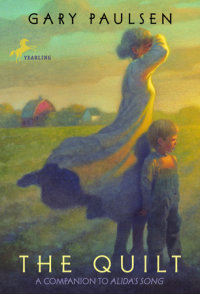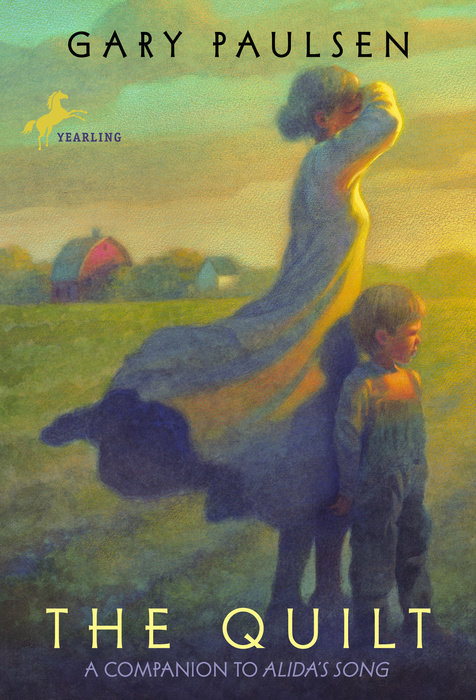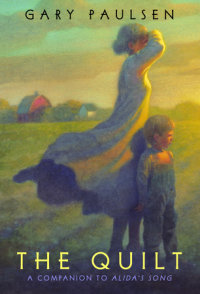For America, World War II lasted for nearly five years. During those years there was a time when the boy could not live with his mother.
His father had gone off to fight one week after the boy was born and his motherwent to work in a munitions factory in Chicago. At first the boy lived with her in the tiny apartment by the elevated railway. Soon, though, other people--men--came to visit her and she started to do very grown-up things. He did not fit in, and when life with his mother became too difficult, he went to live with his grandmother.
The first time this happened his grandmother was working as a cook for a group of men building a war road from northern Minnesota up into Canada. They spent a wonderful summer together; later he would remember only good things about those months and indeed all the times he was with his grandmother.
He called her Grandma. Her name was Alida but he called her Grandma and he loved her very much, as he…
For America, World War II lasted for nearly five years. During those years there was a time when the boy could not live with his mother.
His father had gone off to fight one week after the boy was born and his motherwent to work in a munitions factory in Chicago. At first the boy lived with her in the tiny apartment by the elevated railway. Soon, though, other people--men--came to visit her and she started to do very grown-up things. He did not fit in, and when life with his mother became too difficult, he went to live with his grandmother.
The first time this happened his grandmother was working as a cook for a group of men building a war road from northern Minnesota up into Canada. They spent a wonderful summer together; later he would remember only good things about those months and indeed all the times he was with his grandmother.
He called her Grandma. Her name was Alida but he called her Grandma and he loved her very much, as he would love her the rest of her life and his life, and she adored him as well and cooked him apple pies and knitted stockings and mittens for him even though it was summer and read him letters from his mother, which made him love his mother, even though sometimes he would look at the paper his grandmother held and see that there was no writing on it. And she spoke to him in Norwegian as if he were a little man and not a boy.
The second time he went to live with his grandmother he was just six and he stayed with her at first in her small house in a little town near the Canadian border, in Minnesota.
There were only a hundred and forty people living in this town and he lived with her in a two-room house that was set on the outskirts of the village near a small stream. The water made a wonderful burbling noise that helped him sleep when he thought of his mother in Chicago and missed her.
Once, while his grandmother was sitting at the small table in the one room that served as parlor, living room and kitchen, he asked her, "If I miss Mother so much"--and he called her Mother then, although when he spoke to his mother he always called her Mom--"why is it that I can't be with her?"
And his grandmother, who was crocheting what would become a bedspread, put her crocheting down on her lap. She took him in her arms, which he always liked but did not see a reason for now, and said, "She is living in a very fast time, your mother, and working very hard, and she would not have time to spend with you and that would make her sad. It's bad to be sad."
"Sometimes in the night when I think of her and miss her I'm sad."
"I know, I know. And that is why you're with me. That's just the way things are now."
"Is it because of the war?"
"Yes. It's the war."
"I thought it was because of the men who came home with her from the plant where they make bullets for the soldiers."
"No. Those men are nothing and you mustn't think about them."
"Do they come home with her because of the war?"
"Yes. They are nothing to think about." And she went back to her crochetingexcept that he could see that her fingers went very fast and hard with the crochet hook, and she missed a stitch and had to go back. He could tell that she was upset but could not understand why and thought it was something he'd said, and hugged her and stood next to her that way for several moments. Then he said, because he thought it would help, "I don't miss my father at all."
Her fingers stopped for a moment, then continued, more slowly, and she sighed. "You never saw him. He was in the deserts in California training in tanks when you were born and they sent him right overseas."
"But I will see him someday."
"Yes."
"After the war."
"Yes, after the war."
He thought for another moment. "When will the war be over?"
Her fingers stopped again and her voice grew tight and with the clipped sound of her Norwegian accent had almost knife edges. "When men are sick and tired of being men . . ." She trailed off. "Never mind. The war will be over when it's over. Go play outside."
It was summer and he played on the edge of the water and in the stream, which was only ankle-deep, making boats with leaves and sticks and lying down on his side to make them look bigger so they were like ships as they bounced and careened down the rapids. Enemy ships, which he had seen in newsreels on the rare occasions when his mother had taken him to Gene Autry and Roy Rogers movies in Chicago, which he liked very much--the movies--even though he did not know exactly what an enemy was except that one was German and one was Japaneseand he did not know exactly what they were except that they were bad and soldiers were fighting them.


